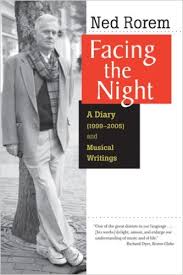 Facing the Night: A Diary (1999-2005) and Musical Writings
Facing the Night: A Diary (1999-2005) and Musical Writings
by Ned Rorem
Shoemaker & Hoard.
240 pages, $25.
THERE IS no elegant design to Facing the Night. Ned Rorem’s new book is divided simply into three parts: diary entries made between 1999 and 2005, recent musical writing, mostly about composers Rorem has known, and program notes, including those written for his well-received 2006 opera Our Town. In a preface Rorem acknowledges that his writing is obsessive and repetitious. He also fears he has grown self-pitying. He needn’t. Near the end of the diary, Rorem mentions an event familiar to most men over fifty, rising on schedule to pee in the night. He does this with words both funny and apt, picturing himself “staggering to the bathroom where I hear laughter in the toilet.” At 82 and still a lucid, captivating writer, Ned Rorem is an authority on the mockeries of old age. He is also our most articulate and musically knowledgeable living composer. So, for two reasons this book is well worth reading.
Candor and the absence of malice toward others, characteristics of all of Rorem’s published diaries, are features of this book as well. As far as possible in writing of this sort, Rorem avoids creating a persona, a trumped-up version of himself for posterity. He records his experiences in the years after the death of Jim Holmes, his companion of 32 years. He writes simply and frankly about his feelings and his physical and mental condition: “fatigue, depression, insomnia, futility, crankiness, dizziness, all growing worse.” The word “suicide” appears frequently. So does the obsession with sex and the lack of interest in food. Rorem’s sleep is disturbed by loud noises; he cannot stand cell phones or the sound of women’s clog heels. These diar y entries describe what anyone with elderly friends or family has witnessed and what we are all destined to experience if we live long enough. In the end, life comes down to a few basic concerns: sleeping, eating, bowels and bladders, sex—or the memory thereof.
y entries describe what anyone with elderly friends or family has witnessed and what we are all destined to experience if we live long enough. In the end, life comes down to a few basic concerns: sleeping, eating, bowels and bladders, sex—or the memory thereof.
Rorem seeks diversions from his depression and physical discomfort in plays and movies, books and TV. But he no longer has time to be bored. The diary contains many witty, astute observations on high and low art. Noting that a critic had called the movie Gladiator “intelligent,” Rorem writes, “After about an hour I wondered: When does the intelligence start? Then left.” Rorem misses very little in the world around him. An obsession with verbal precision, whether in English or in French, has been evident throughout his career as a writer. He is still challenging the correctness of a certain translation from the French or pointing out the misuse of words, such as Robert Frost’s use of the word “diverged” in “The Road Not Taken.” Some diary entries are nothing but anagrams, word games, and riddles. Others identify unlikely musical borrowings and “sound-alikes.” It is almost as if, near the end of his days, this man finds himself helplessly entangled in the mysteries of the words and notes that have filled his life.
An avowed atheist, Rorem is not looking toward a realm beyond this earth as he faces the end of his time. He resembles the ancient Greeks in his stoicism and in the way he measures his worth as a man. Rorem’s primary life work has been composing music, and in this he can claim to have worked hard and achieved a good deal of success. Even in these years of loneliness and despair, he never loses confidence in his musical ability. He may lack commissions, but not the inspiration to compose. This ongoing and vigorous engagement with music gives the last two parts of Facing the Night a tone different from the first.
Many of the pieces about composers and writers were written as appreciations or obituaries when Rorem was president of the American Academy of Arts and Letters. Taken together, these pieces comprise a short history of 20th-century artists and influences. The sketch of Allen Ginsberg, which draws on old diary entries, is astonishingly personal and insightful about the poet’s career. The description of Franco Zeffirelli cooking dinner for Rorem is as vivid as a good foreign film. Rorem’s thoughts about classical music, if taken seriously by the managers and conductors of major orchestras, might just save the big concert halls from oblivion, filled as they now are by gray-haired patrons. “Ours is the only musical era in history where the past takes precedence over the present, where the performer takes precedence over the composer.” Rorem likens this situation to a world in which only the plays and books of the 19th century were performed and published.
Facing the Night ends with the program notes for Our Town. The Thornton Wilder play about the passing beauty of life has connections with Aaron Copland, Rorem’s friend and mentor, who wrote music for a film version. Rorem composed the music for the opera while in his eighties. There is an elegance to the association of these three gay men and artists. Wilder and Copland are gone, but their work remains. Rorem, too, has created an artistic legacy that can be expected to endure.
Daniel Burr is an assistant dean at the Univ. of Cincinnati College of Medicine, where he also teaches courses on literature and medicine.





